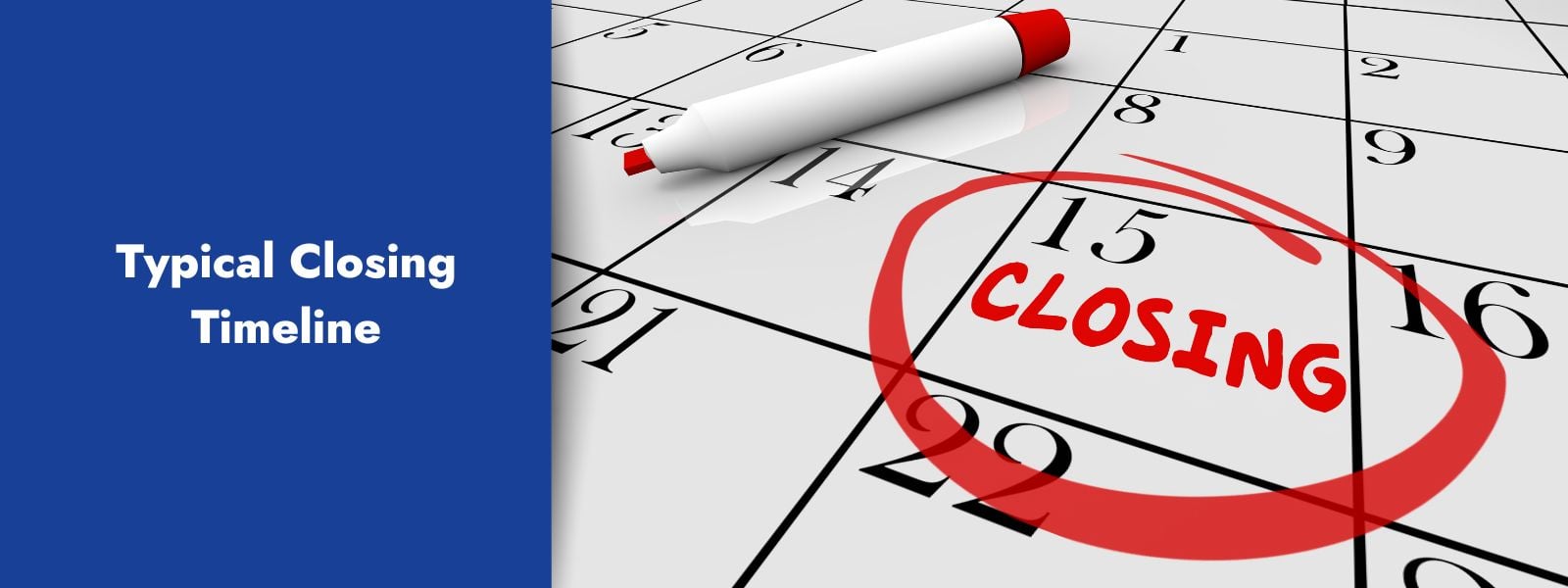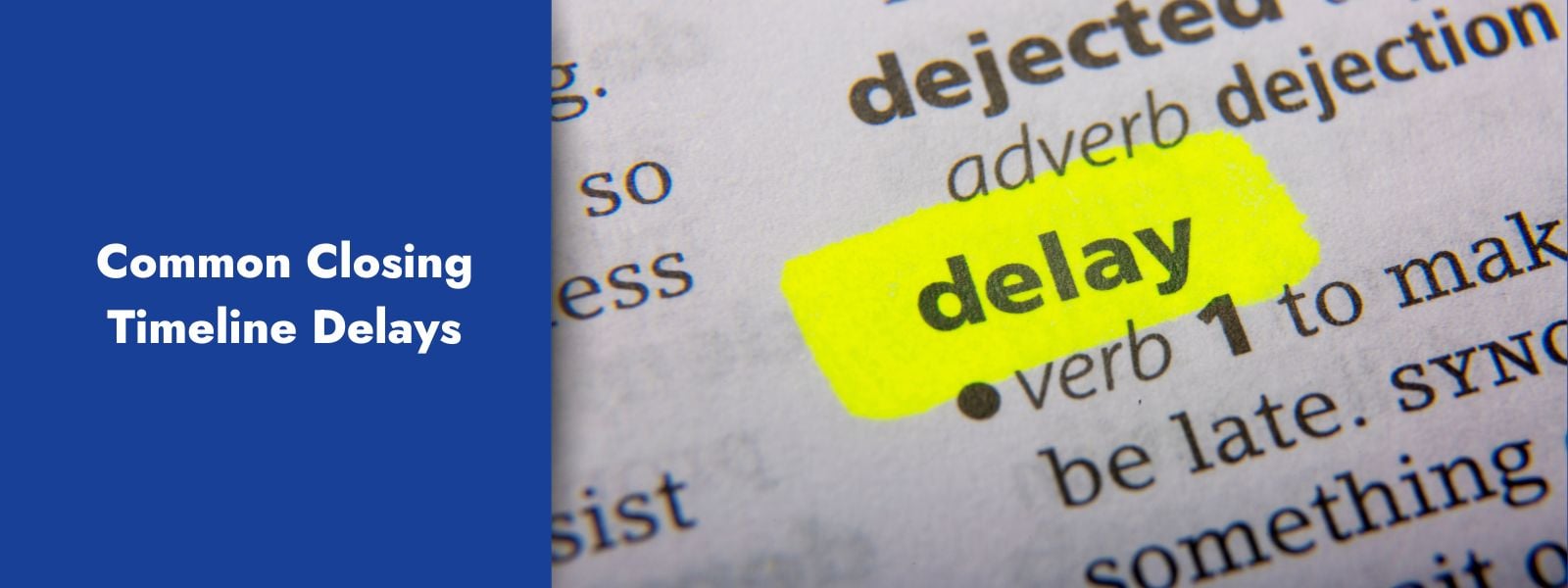Buying a home is an exciting and significant milestone in one’s life. However, the path to homeownership can be complex, and one of the most critical aspects of the process is the closing timeline.
How long does closing on a house take? That’s one of the most common questions we hear about real estate transactions. It’s a question asked by buyers and sellers alike. There are a number of factors that influence the home closing timeline. On average, you can expect closing on a house to take 30 to 60 days with a mortgage. Cash purchases are completed much faster.
Understanding the various stages involved in closing on a house and how long each step typically takes is essential for a smooth and stress-free experience. In this comprehensive guide, we will delve into the typical buyer closing timeline, what to expect at closing, common delays, and valuable tips to expedite the process. So, whether you’re a first-time homebuyer or a seasoned pro, read on to gain insight into the intricacies of closing on your dream home.

Typical Home Closing Timeline
The buyer closing timeline refers to the sequence of steps that occur after a buyer makes an offer to purchase a property. It continues until the sale is officially closed and the buyer takes ownership. This timeline can vary depending on several factors. These include the type of property, location, and local regulations and practices. Here’s a general overview of the key stages involved in a buyer closing timeline:
1. Offer > Negotiate > Sign Purchase Agreement
Timeframe: 3 to 14 days
The buyer makes an offer to purchase the property, which includes the proposed purchase price and other terms and conditions. If the seller accepts the offer, a legally binding contract is formed. However, if the seller declines the offer, you’ll begin negotiating the purchase agreement with the seller. The purchase and sale agreement describes the transaction in detail, including the home’s selling price, conditions of the sale, the closing date, inspections, etc.
Once both parties agree to the terms and sign the contract, you’ve taken the first step toward homeownership. The length of this stage can vary widely, depending on market conditions, negotiation skills, and the complexity of the deal. It can take a few days, all the way up to a few weeks to reach a mutually acceptable agreement.
Your purchase and sale agreement may contain conditions that must be met to close the home sale. These are called contingencies, and the most common ones are:
- Appraisal Contingency: An appraisal contingency is a clause in a real estate contract that allows the buyer to back out of the deal or renegotiate the purchase price if the appraised value of the property comes in lower than the agreed-upon price.
- Financing Contingency: A financing contingency is a provision in a real estate contract that gives the buyer the option to cancel the deal if they are unable to secure the necessary mortgage financing within a specified timeframe.
- Inspection Contingency: An inspection contingency is a condition in a real estate contract that permits the buyer to have a professional inspection of the property to identify any issues or defects. If significant problems are discovered, the buyer may request repairs, credits, or even withdraw from the contract.
2. Get Mortgage Approval
Timeframe: 30 to 60 days
Once a buyer is pre-approved for a mortgage, the mortgage approval process moves forward with several key steps. The first stage involves the buyer submitting their formal mortgage application to the lender. During this process, the lender reviews the buyer’s financial documentation, including income statements, tax returns, bank statements, and credit history. The lender also assesses the property’s value and confirms that it meets their lending criteria.
After the initial review, the lender proceeds with underwriting, a thorough evaluation of the borrower’s creditworthiness and the property’s eligibility. Underwriters consider various factors such as the buyer’s debt-to-income ratio, employment history, and the property’s appraisal value. They also verify the accuracy of the information provided in the application.
Once the underwriting process is complete, the lender issues a formal mortgage commitment, indicating that the loan has been approved, subject to certain conditions or contingencies. These conditions may include the completion of specific paperwork, additional documentation, or addressing any outstanding issues. The buyer is then required to meet these conditions to finalize the mortgage approval and move forward to the closing stage, where the loan funds are disbursed, and the property officially changes ownership.
The time it takes to get mortgage approval can range from 30 to 60 days, although it can be shorter for buyers with excellent credit and financial stability.
3. Open an Escrow Account
Timeframe: 1 to 7 days
Once your mortgage is in the works, it’s time to open an escrow account and submit your earnest money deposit or “good faith deposit.” The earnest money serves as a deposit to demonstrate your commitment to the purchase. Typically, this amounts to 1-2% of the home’s purchase price and is held in escrow until closing. Your real estate agent can submit your earnest money deposit to the listing agent who will put it into an escrow account.
While listing agents typically open the escrow account, anyone involved in the transaction may do so. Escrow accounts are managed by a third party who isn’t involved in the real estate transaction. This type of account is designed to protect both buyers and sellers. If your closing goes according to plan, your earnest money deposit will be applied to your down payment. However, if you break any part of the contract, the seller can keep the money. Opening an escrow account is a straightforward process that usually takes just a day or two.
4. Run a Title Search
Timeframe: 10 to 14 days
One crucial step in the home-buying process is the title search. The title search is conducted to ensure that the property has a clear title and is free from any legal issues. A title search will bring up any issues with the title, such as an existing lien or unpaid property taxes, which could jeopardize your legal right to buy and live in the home.
The time it takes for a title search can vary depending on the complexity of the property’s history and local regulations. On average, it can take 2-3 weeks. Additionally, purchasing title insurance is essential to protect against the cost of title claims during your ownership.
5. Get a Home Inspection
Timeframe: 5 to 14 days
The home inspection process is a crucial step for buyers during the real estate closing process. It’s aim is to assess the property’s overall condition and identify any potential issues. A licensed home inspector conducts the inspection, examining various key areas of the home. These areas include the structural components, such as the foundation, walls, roof, and attic, as well as the plumbing, electrical, and HVAC systems. Inspectors also assess the condition of appliances, the integrity of the windows and doors, and the general safety of the property.
The home inspection report is a comprehensive document that summarizes the inspector’s findings. It provides detailed information about any defects or issues found during the inspection, along with recommendations for necessary repairs or further evaluation. The report typically includes photographs to illustrate specific issues, making it easier for buyers to understand the extent of the problems.
Armed with this information, buyers can negotiate with the seller to address any significant issues, potentially leading to repairs, credits, or a lower purchase price before finalizing the real estate transaction. The home inspection report is a valuable tool that helps buyers make informed decisions and ensures that they are aware of the property’s condition before taking ownership.
6. Get a Home Appraisal
Timeframe: 5 to 14 days
The lender will typically order an appraisal of the property to determine its fair market value and ensure that the loan amount is appropriate. A licensed appraiser with no connection to the buyer, seller, or lender conducts the appraisal.
During the appraisal, the appraiser will visit the property to evaluate its condition, size, features, and any recent improvements or renovations. They also consider comparable sales (commonly referred to as “comps”) in the surrounding area to assess the property’s value relative to similar homes that have recently sold. The appraiser then compiles their findings into a detailed appraisal report. This report includes the appraiser’s assessment of the property’s value and the reasoning behind their valuation.
The appraisal report is crucial in determining whether the property’s appraised value matches or exceeds the purchase price. If the appraiser determines that the home’s value is less than the agreed-upon purchase price, it can potentially impact the buyer’s ability to secure financing. In such cases, buyers may need to renegotiate the purchase price. Work with the seller to find a purchase price that’s aligned with the home’s value.
Overall, the home appraisal process plays a vital role in real estate transactions. It ensures that buyers and lenders don’t overpay for a home.
7. Get Homeowners Insurance
Timeframe: 1 to 3 days
Securing homeowners insurance is essential to protect your investment. You’ll likely face a couple of different insurance charges when closing on a home. Homeowners insurance provides liability coverage and protects you financially from damages to your property. In some locations, you may also need or want separate flood or earthquake insurance policies.
Start shopping for insurance early in the process to ensure you have adequate coverage in place by the closing date. The time it takes to obtain homeowners insurance can vary, but on average, it takes 2-3 weeks.
8. Perform Final Walk-Through
Timeframe: < 1 day
A few days before closing, it’s customary for the buyer to conduct a final walk-through of the property. This allows you to ensure that the property is in the same condition as when you made the offer. You can check to see that any agreed-upon repairs have been completed. Look for any issues or damage that may have occurred since the home inspection was conducted. Also, check to make sure that nothing included in the purchase agreement has been removed. The final walk-through typically takes about 30 minutes and is usually scheduled a day or two before closing.
This is typically when you’ll receive your closing disclosure which outlines your final costs and loan terms. This document finalizes the details of your mortgage, such as the interest rate, monthly payment, cash to close, and more. You’ll receive this document at least three business days before closing.
10. Get Through Closing Day
Timeframe: < 1 day
On closing day, the buyer and the seller come together to sign the necessary paperwork that formally transfers the ownership of the property from the seller to the buyer. This signifies the completion of the real estate transaction. Additionally, the buyer finalizes their loan arrangements, ensuring that the necessary funds are in place for the purchase.
During this process, any money held in the escrow account is disbursed to the relevant parties, such as the seller, real estate agents, and any other entities involved in the transaction. Finally, the buyer is presented with the deed to the property and receives the keys to their new home.
Closing day is the culmination of all your efforts and patience throughout the home-buying process. The closing process itself typically takes 1-2 hours. Once all the documents are signed and the funds are transferred, you’ll receive the keys to your new home.

What to Expect at Closing
Closing day can be a whirlwind of paperwork and emotions, but knowing what to expect can help ease the process. Here’s what you can anticipate at closing:
- Review and Sign Documents: You’ll be presented with a stack of documents to review and sign. These include the loan documents, the closing disclosure, and various other legal papers. It’s essential to read each document carefully and ask questions if anything is unclear.
- Payment: You’ll need to bring a cashier’s check or wire the funds for your down payment and closing costs to the bank. Make sure to confirm the exact amount and payment method with your lender or closing agent in advance.
- Final Verification: The closing agent will verify that all funds have been received and that all necessary documents are in order before proceeding with the closing.
- Handover of Keys: Once all documents are signed and funds are verified, you’ll receive the keys to your new home. Congratulations, you’re officially a homeowner!
Overview of Closing Documents
When the closing occurs, you will be given a set of important documents to sign, which could amount to over 100 pages. It’s essential to seek guidance from your real estate attorney or realtor to understand the purpose of each document. Some of the documents you will likely receive include:
- Loan Estimate: This document provides crucial details about your loan such as terms, interest rate, and closing costs. It’s important to verify the accuracy of all the information, including the correct spelling of your name.
- Closing Disclosure: Similar to the loan estimate, the closing disclosure outlines the specifics of your mortgage. You should receive this form at least three days before the closing date, allowing you to compare it with the loan estimate.
- Initial Escrow Statement: This form contains details of the payments that the lender will make from your escrow account during the first year of your mortgage, including taxes and insurance.
- Mortgage/Promissory Note: This document represents your commitment to repay the mortgage, specifying the loan amount, terms, and the actions the lender can take if you fail to make payments.
- Mortgage or Deed of Trust: This document secures the note and gives your lender a claim against the home if you fail to meet the terms of the mortgage note.
- Certificate of Occupancy: If you’re purchasing a newly constructed house, this legal document is necessary for moving in. Additionally, it’s advisable to request a copy of the title policy and survey.
- Purchase Agreement: This legally binding contract outlines the terms of a real estate transaction, and signing it finalizes the property purchase.

Common Closing Timeline Delays
While the typical closing timeline provides a general guideline, various factors can lead to delays in the process. Studies have shown that up to 32% of house closings are delayed and almost half of them are due to financial issues. Here are some common reasons for closing delays:
Title Search & Title Insurance
A thorough title search is essential to ensure that the property’s title is clear and free from any encumbrances. Delays in the title search can occur if there are unresolved liens, legal disputes, or other issues related to the property’s ownership history. Additionally, the process of obtaining title insurance may require additional time if unexpected title problems arise.
Appraisal & Inspection Issues
Home appraisals and inspections are crucial steps in the closing process, and issues that arise during these assessments can lead to delays. If the appraiser determines that the home’s value is lower than the agreed-upon purchase price, negotiations may be necessary to address the discrepancy. Similarly, if the home inspection uncovers significant issues or necessary repairs, additional time may be needed to resolve these matters with the seller.
Unmet Contingencies
Contingencies outlined in the purchase agreement, such as repairs to be completed by the seller or financing conditions, must be met before closing can proceed. Delays can occur if these contingencies are not satisfied within the specified timeframe. It’s essential for both buyers and sellers to communicate and work diligently to fulfill their respective obligations to avoid closing delays.

Tips for Closing on a House Faster
Closing faster is as simple as making sure you’re prepared for the process and have all the necessary paperwork. Some delays may be out of your control. There are several steps you can take to avoid closing delays and expedite the closing process:
Complete Lender Requirements Immediately
Promptly respond to any requests or documentation required by your mortgage lender. Delayed submission of financial information or documents can slow down the approval process and potentially jeopardize your closing timeline. Stay in close contact with your lender to ensure a smooth and efficient mortgage approval process.
Review Your Closing Disclosure
Carefully review your closing disclosure (CD) when it is provided to you at least three business days before closing. The CD outlines the final terms of your loan, including interest rates, closing costs, and payment details. Ensure that all the information is accurate, and address any discrepancies or questions with your lender before closing day.
Have Your Finances in Order
Before embarking on the home-buying journey, it’s essential to have your finances in order. This includes having a mortgage pre-approval letter from your lender, a solid understanding of your home-buying budget, and the funds for your down payment and closing costs readily available. Being financially prepared can help streamline the process and reduce the risk of delays.

Wrapping Up Our Guide To Buyer Closing Timelines
Closing on a house is a significant achievement, but it can also be a complex and time-consuming process. Understanding the typical buyer closing timeline, what to expect at closing, common delays, and effective strategies to expedite the process can help you navigate the journey with confidence.
Remember that every real estate transaction is unique, and unforeseen challenges may arise. However, by staying informed and proactive, you can increase your chances of a smooth and timely closing, bringing you one step closer to the keys to your new home. So, as you embark on your home-buying journey, keep these insights in mind.
To learn more about buying a home, HPGR is here to help facilitate your home-buying journey. A long-standing and trusted Fort Worth real estate agency, we’ve been serving buyers and sellers since 1958.
With over six decades of success behind us, you’ll surely have peace of mind knowing your best interests are being represented throughout the home-buying process. To speak with one of our agents, give us a call at (817) 923-7321 or contact us.

FAQs
How Long Does it Take to Close on a House?
According to Rocket Mortgage, it typically it takes 30 to 45 days to close on a house. It depends on the factors discussed throughout this post and how long it takes to complete them.
How Much Are Closing Costs When Buying a House?
If you get a mortgage to buy a home, you’ll have to pay closing costs. These fees are paid to third parties that help facilitate the sale of a home. Closing costs typically total 2% to 7% of the home’s purchase price. So on a $500,000 home, you can expect closing costs to run anywhere from $10,000 to $35,000.
How Much Money Do I Need for a Down Payment?
The amount of money required for a down payment depends on several factors, including the type of mortgage loan program and the lender’s specific requirements. Traditional mortgage loans typically require a down payment of around 20% of the home’s purchase price. However, there are several government-backed loan programs that offer more flexible down payment options.
For example, FHA loans often require a minimum down payment of 3.5% of the purchase price. USDA loans and VA loans can offer eligible buyers the opportunity to purchase a home with no down payment at all. Keep in mind that the down payment requirement can also vary based on the borrower’s credit score, financial history, and the lender’s policies. Check out our post about how to find extra down payment money when buying a house.

